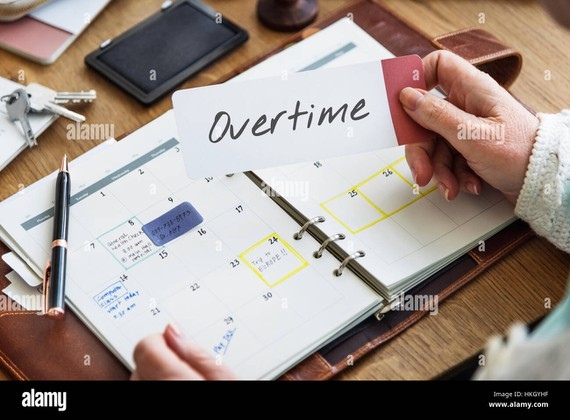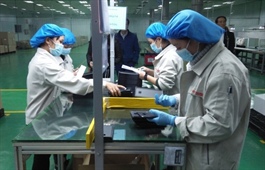Businesses propose overtime working hours
Businesses propose overtime working hours
Plans to increase overtime working hours for industry workers has been implemented by many countries around the world, to cover for an increasing labor shortfall.
Illustrative photo. |
Mr. HONG SUN, Vice President and General Secretary of the Korean Chamber of Commerce in Vietnam (KORCHAM), believes that the proposal to increase overtime working hours to cover for the current labor shortage across various industries in Vietnam will meet the real needs of businesses as well as support workers.
According to Mr. Hong Sun, enterprises in South Korea and in Vietnam are facing a huge shortfall of labor and as a result production is lagging behind. As per statistics, since the outbreak of the Covid-19 pandemic until now, the number of enterprises seeing a fall in human resources has increased substantially, with many enterprises showing a shortfall of labor from 15% to 30%, with some enterprises even facing a 50% shortfall for production operations. Therefore, if in coming time it is not possible to add human resources, the necessary solution at this time is to increase labor time.
The need to increase overtime hours for work is necessary for both businesses as well as workers and employees who need it. For some workers who cannot meet their needs with their main income, this plan offers a boon for extra income. I think this is an appropriate solution and the Vietnamese government should implement it soon. Some countries in the world have been implementing this solution for a long time, but they are somewhat easier than Vietnam. Actually working overtime depends mainly on the contract between the employee and the employer, and is completely voluntary. Some governments allow businesses and employees to self-regulate and negotiate overtime working hours, which benefits both employees and businesses.
JOURNALIST: - Sir, a few years ago, KORCHAM also proposed to increase overtime working hours but it was not approved? What was the reason for that?
Mr. HONG SUN: - That's right. In previous years, we had proposed to increase the overtime working hours for employees, but the Government of Vietnam has not yet accepted our proposal, because it is not related to the prescribed labor law. This is also a great pressure for businesses, especially large-scale enterprises that need a lot of labor.
In fact, not only KORCHAM but also other businesses and employees have proposed to increase overtime working hours. The Association of Japanese Enterprises and the European Chamber of Commerce in Vietnam also proposed to increase overtime working hours, because the strict regulations on limiting the number of overtime hours are hindering both employees and employers.
Many Foreign Direct Investment (FDI) enterprises face difficulties due to the limit on the number of overtime hours of four hours per week, 30 hours per month, 200 hours per year. Only a few industries that need to concentrate a lot on labor such as garment, textile, and footwear require 300 hours per year. Meanwhile, Vietnamese labor productivity is still quite low, not guaranteeing production for seasonal enterprises, but must ensure contract progress.
Currently, this requirement is becoming more and more urgent for businesses, because the overtime solution also helps businesses ensure employees participate in production, and help restore production and business after a long time being severely affected by the Covid-19 pandemic.
-Sir, what is the current regulation on overtime working hours in South Korea?
- In South Korea, the number of recognized overtime working hours is about 600 hours per year, i.e. 12 hours per week, while Vietnam imposes a ceiling on 200 hours per year, while some occupations have increased to 300 hours per year. This is a very low level.
Regulations on overtime working hours for such enterprises will greatly limit production and economic development. Firstly, it has a great influence on the investment decision of foreign investors in Vietnam. Secondly, it is not bringing into full play the actual productivity of employees, and not exploiting all labor resources when Vietnam is in the period of a golden population. Thirdly, it is difficult for employees to have the opportunity to improve their income and improve their living standards.
Even if the Labor Code raises the limit on overtime to 300 hours per year, businesses, especially for those that are labor-intensive, these number of hours are not enough to make up for labor shortage and labor productivity is still low.
-Sir, will South Korean businesses invest more in Vietnam if there is a new regulation on increasing overtime working hours? What is the investment prospect of South Korean enterprises in Vietnam this year?
- Of course, it is possible. Even if the overtime regulation has not been approved, Vietnam has been an attractive investment market for South Korean investors. Vietnam is currently the largest smartphone production base of Samsung Electronics.
By 2021, 50% of the company's smartphones globally are made in Vietnam. Despite the difficulties caused by the pandemic, in 2021, Samsung Vietnam still grew 14%, reaching more than USD 74 bn, and export turnover increased by 16%. In 2022, investment from South Korea into Vietnam could reach USD 10 bn. This year there may be a few very big projects, especially in the energy sector with a scale of USD 3 bn to USD 6 bn. We will definitely continue to expand our investment in Vietnam.
In the long term, I think that Vietnam is still an attractive investment destination for South Korean businesses, not only because of its stable political economy and competitive costs, but also because of the quality of its labor force and the opportunities brought by Free Trade Agreements that Vietnam has signed.
- Thank you very much.





















